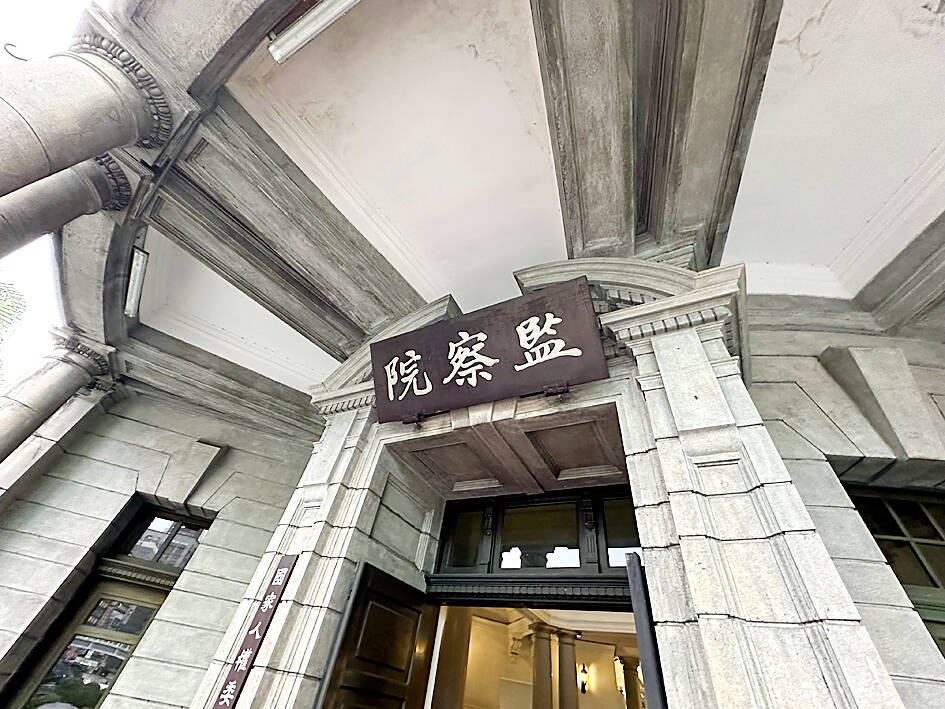The Taiwan People’s Party (TPP), with support from the Chinese Nationalist Party (KMT), yesterday proposed a constitutional amendment to abolish the Control Yuan.
TPP Chairman Huang Kuo-chang (黃國昌) and KMT Legislator Lo Chih-chiang (羅智強) proposed amendments to articles 3, 4 and 7 of the Additional Articles of the Constitution.
The amendments would abolish the Control Yuan and transfer its audit power to the Legislative Yuan, including giving the latter oversight of the Executive Yuan’s annual accounting and finances.

Photo: Taipei Times
A constitutional amendment must be proposed by at least one-quarter of the 113-member Legislative Yuan, and passed by three-fourths of the members at a meeting with a quorum of three-fourths of the legislature.
At a news conference prior to a final tally of supporters, Huang said he was confident his party would reach the 25 percent threshold necessary to submit the amendment.
Abolishing the Control Yuan has been a long-term goal of the party, one that former TPP chairman Ko Wen-je (柯文哲) also campaigned on in his presidential run last year, but it did not have enough seats in the Legislative Yuan to make it a reality, Huang said.
“The public has had enough of this committee of ‘big baby’ supervisors,” Huang said, referring to members of the Control Yuan.
They abuse their power, violate the law and only work on behalf of their own party, he added.
Huang later on wrote on Facebook that the proposal has surpassed the required support of at least 29 lawmakers, thanking his fellow opposition lawmakers for their support.
Democratic Progressive Party (DPP) caucus chief executive Rosalia Wu (吳思瑤) said that the DPP has long supported the abolition of the Control Yuan, including in the prior Legislative Yuan, but not as an act of political revenge.
The DPP is willing to work with opposition lawmakers to promote constitutional reform and improve the system, she added.
If the proposed constitutional amendment is passed, it must be voted on by eligible voters, with the number of “yes” votes exceeding half of the total number of eligible voters.
Separately, the TPP yesterday also proposed extending the legislative session until Aug. 31, with KMT caucus secretary-general Wang Hung-wei (王鴻薇) expressing support.
The KMT previously proposed extending the session until July 31, drawing criticism from the DPP, which accused it of seeking to dodge accountability.
Wu said that opposition lawmakers are obstructing justice by using an extended legislative session to “maintain their immunity from prosecution.”
Moreover, by extending the legislative session, opposition lawmakers, many of whom are facing recall votes, can continue to try and “buy votes” through populist bills such as a military pay increase and a proposed NT$10,000 (US$337) universal cash handout, Wu said.
Chinese-language media have reported that each extra day of a legislative session would cost NT$10 million, Wu said, adding that it is a waste of taxpayer money and does not benefit the country.

Taiwanese can file complaints with the Tourism Administration to report travel agencies if their activities caused termination of a person’s citizenship, Mainland Affairs Council Minister Chiu Chui-cheng (邱垂正) said yesterday, after a podcaster highlighted a case in which a person’s citizenship was canceled for receiving a single-use Chinese passport to enter Russia. The council is aware of incidents in which people who signed up through Chinese travel agencies for tours of Russia were told they could obtain Russian visas and fast-track border clearance, Chiu told reporters on the sidelines of an event in Taipei. However, the travel agencies actually applied

New measures aimed at making Taiwan more attractive to foreign professionals came into effect this month, the National Development Council said yesterday. Among the changes, international students at Taiwanese universities would be able to work in Taiwan without a work permit in the two years after they graduate, explainer materials provided by the council said. In addition, foreign nationals who graduated from one of the world’s top 200 universities within the past five years can also apply for a two-year open work permit. Previously, those graduates would have needed to apply for a work permit using point-based criteria or have a Taiwanese company

The Shilin District Prosecutors’ Office yesterday indicted two Taiwanese and issued a wanted notice for Pete Liu (劉作虎), founder of Shenzhen-based smartphone manufacturer OnePlus Technology Co (萬普拉斯科技), for allegedly contravening the Act Governing Relations Between the People of the Taiwan Area and the Mainland Area (臺灣地區與大陸地區人民關係條例) by poaching 70 engineers in Taiwan. Liu allegedly traveled to Taiwan at the end of 2014 and met with a Taiwanese man surnamed Lin (林) to discuss establishing a mobile software research and development (R&D) team in Taiwan, prosecutors said. Without approval from the government, Lin, following Liu’s instructions, recruited more than 70 software

Taiwanese singer Jay Chou (周杰倫) plans to take to the courts of the Australian Open for the first time as a competitor in the high-stakes 1 Point Slam. The Australian Open yesterday afternoon announced the news on its official Instagram account, welcoming Chou — who celebrates his 47th birthday on Sunday — to the star-studded lineup of the tournament’s signature warm-up event. “From being the King of Mandarin Pop filling stadiums with his music to being Kato from The Green Hornet and now shifting focus to being a dedicated tennis player — welcome @jaychou to the 1 Point Slam and #AusOpen,” the